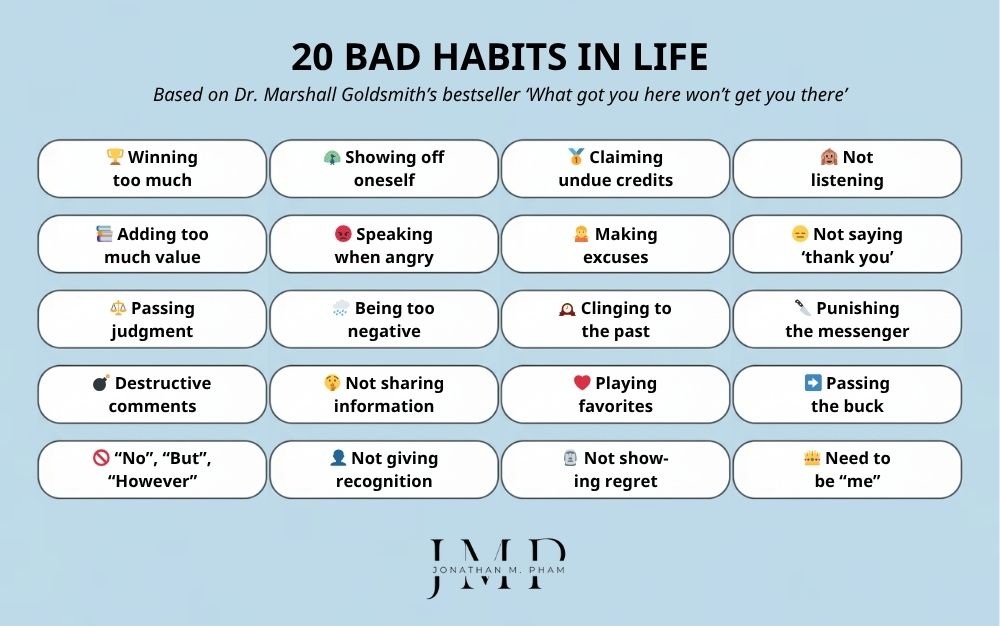Discover the 20 bad habits in life that sabotage one’s relationships and success, plus how to overcome them for a better life.
We all have certain qualities that are not so good; some of them, if left unchecked, can be quite detrimental in the long run. This article explores a list of 20 bad habits in life that have been identified by Dr. Marshall Goldsmith in his bestseller ‘What got you here won’t get you there‘. From winning too much to refusing to say sorry, these behaviors all pose a significant negative impact on one’s relationships and overall success.
Why Do We Need to Let Go of Bad Habits in Life?
Actions speak louder than words. While knowledge and experience may help one attain success to a certain degree, it is their behavior that will ultimately determine if they can advance to greater heights.
Many times, we speak about the need to adopt certain qualities (e.g. decisiveness, flexibility, etc.) while failing to mention the importance of abandoning bad habits. These habits, often ingrained in our daily lives, act as invisible barriers that hinder progress, erode relationships, diminish productivity, and limit our potential.
While they may be self-perpetuating and difficult to break, overcoming them should pave the way for long-term positive change.
How, you may ask? Simple. Just do nothing at all.
There’s nothing so special about letting go. Just stop doing it. No need to learn anything new.
If you suffer from the bad habit of making sarcastic comments, remind yourself to be silent when someone presents an idea. No need to say anything complimentary; just be quiet.
If you are known for frequently acting like a know-it-all, then remind yourself to keep your mouth shut when someone offers a helpful suggestion. If you can follow with a “Thank you”, that’s even better.

20 Bad Habits in Life That Sabotage Success & Fulfillment
In his book “What got you here won’t get you there”, Dr. Marshall Goldsmith identifies 20 bad habits in life that hinder one’s professional advancement. These negative behaviors, if left unchecked, can seriously impact relationships, productivity, and overall success.
Winning too much
Winning too much refers to the desire to always be right or come out on top, even when it’s unnecessary or harmful. It is a particularly common behavior among successful people, and is, in truth, the starting point of all other bad habits in life.
Instead of trying to maintain positive relationships with others, we are more concerned with proving our viewpoint.
We see every situation as a competition and therefore strive to be the best at everything. In order to maintain an edge over others, we feel compelled to withhold valuable information and afraid of sharing them publicly.
When it comes to personal mistakes, we find it so challenging to be humble and acknowledge our shortcomings, as if it’s a big loss.
While a competitive spirit may be beneficial in certain circumstances, the habit of winning at all costs creates tension, damages relationships, and ultimately hinders professional advancement. It’s essential to strike a balance between being assertive and being cooperative – as well as to recognize that sometimes, it’s more important to maintain positive relationships than to always be right.
Adding too much value
Have you ever been through a situation like this? When someone presents a brilliant idea, another person responds with something like:
“That’s a good idea, but it would be even better if you did it this way“
This compulsion to offer unsolicited advice causes us to overshadow others’ contributions and/ or efforts. It is essentially a byproduct of the desire to win at all costs.
Even if we are not asked for it, we cannot help but share our ideas or solutions in every discussion, believing that they are the best.
There is a fine line between being helpful and over-controlling. Adding too much value only makes others feel like they’re not capable or valuable. Not to mention, it also stifles creativity and creates unnecessary tensions. Despite one’s best intentions, constantly interfering with others’ work only results in a breakdown of relationships and team dynamics.
Passing judgment
While it is OK to express personal ideas in discussions, it is entirely inappropriate to do so when it comes to soliciting feedback or asking people for their opinions about oneself. Passing judgment only makes others feel uncomfortable and drives them away, therefore denying us the opportunity to receive support in times of necessity.
Everyone has their own unique perspective and experiences; judging them is unproductive and does no good at all. Instead of being obsessed with flaws and differences, it is recommended that one keeps their judgment to themselves, practice the art of active listening, and express gratitude for others’ input by saying “Thank you!”.
Making destructive comments
We all know people who frequently employ sarcasm as a defense mechanism. They use humor to mask their insecurities or avoid confrontation, at the cost of hurting others’ feelings.
Many times in life, we make destructive comments without even being aware of it. It is when we come up with an ill-conceived “joke” during a meeting, give an unnecessary comment about one’s appearance, or revisit past incidents to criticize our partner.
And people will not forget our words easily, no matter how fervently we apologize after that.
Saying hurtful things is a common bad habit in life, especially among those who identify themselves as “direct” and “straightforward”. Ironically, we often take pride in being “truthful”, even when we are fully aware that such “truthfulness” negatively impacts others.
If we want to improve our relationships with others, it’s time to stop being “authentic” and ask ourselves: Is it worth it?
Instead of wondering if what we are going to say is true or not, think about whether it is good to be spoken out or not.
Instead of using sarcasm or negative comments, it is a much wiser choice to express oneself in a constructive and respectful way.

20 bad habits in life
Starting with NO, BUT, HOWEVER
It’s an intriguing fact that we employ negative words like “no,” “but”, “however”, etc. more frequently than we think. Just try to record yourself for one whole day, and you will be astonished by the result!
No matter how friendly we appear to be or how much we try to acknowledge people’s feelings, the message we send out is the same: “You are wrong!”
As trivial as they may seem, words like “no,” “but”, and “however” do no good at all; they only shut down communication and drive everyone to engage in pointless disputes, trying to prove their points instead of having a meaningful conversation.
Telling the world how smart we are
Our innate need for validation often drives us to brag and show off our intelligence in various subtle ways. For example, when someone informs us of something we already know, 99% of the time, we will respond with something like:
“I already knew it!”
Even though we do not mean it, such a reply seriously offends the other person. It’s as if we are saying that we are much smarter than they think – and that they are wasting our time. No wonder why they are less likely to support us the next time.
If somebody is trying to be helpful, do not dismiss their efforts. Even if what they do does not produce any significant results, the only appropriate response is “Thank you!”.
Speaking when angry
We are all aware of bosses who frequently get angry at work. They justify their emotional volatility as a management tool, one that allows them to ensure work ethics and deliverables.
While emotional outbursts may “awaken” people for a short period, eventually they do more harm than good.
It’s surprisingly tough to maintain self-control when consumed by anger. Without control, how can you come up with well-informed decisions?
And what will people think of you if you cannot remain calm and collected from time to time?
While anger may force compliance temporarily, it also breeds resistance. Over time, people will be alienated from you.
Instead of speaking when angry, it’s important to take a step back and cool down. Once you’ve had a chance to calm down, you can then address the issue more respectfully.
Negativity
Some people seem to never be able to speak or think about anything constructive at all. Instead, they constantly focus on the negative and find reasons why things won’t work. When presented with something original, their default response is “Well, that won’t work, I will tell you why…” or “Interesting, but the only problem with that is …”
Nobody likes working with or being around those people. Their pessimistic outlook dampens others’ enthusiasm and creativity. If they are in leadership positions, it is highly likely that their team members are very inhibited and afraid of taking risks.

20 bad habits in life
Withholding information
Another common bad habit in life, withholding information is when one refuses to share information with the aim of maintaining an advantage over others. It is a sign of the “survival of the fittest” mentality – when one views others as competitors rather than collaborators.
Ironically, the practice of hoarding information rarely does any good. While some may believe that it will grant them power, the only thing they earn from it is a reputation for being untrustworthy and manipulative.
Fear does NOT give one true power; only loyalty does.
What’s worth mentioning is that, far too often, we withhold information not out of malice, but due to ignorance and busyness. It happens when we:
- Are too preoccupied to update people with vital information.
- Forget to invite a team member to a crucial meeting.
- Fail to provide proper guidance to a subordinate on how to perform a task we delegate to them.
- etc.
Even if we do not mean it, people will get offended by the fact that we do not share enough information with them.
Failing to give proper recognition
Neglecting to acknowledge people’s efforts is not only unjust; it also deprives them of the emotional rewards they deserve. When one is not recognized for their efforts and achievements, their enthusiasm is dampened. Rest assured, they are not going to do their best the next time.
It’s important to acknowledge and reward the contributions of others, even if it’s just a simple “thank you.” Proper recognition is essential to boosting morale, cultivating relationships, and creating a more positive environment.
Claiming undue credits
Claiming credit one doesn’t deserve is another manifestation of the desire to win at all costs (which has been discussed above).
Many times, it’s not so simple to figure out who deserves the recognition for the team’s success. When faced with the choice between either allowing credit to be taken by others or seizing it for ourselves, we often succumb to the temptation of going with the second choice.
If individuals are too self-centered and obsessed with proving their self-worth, how can you expect a team to function properly?
As pointed out by Dr. Goldsmith, one way to combat this bad habit is to promote a culture of shared credit. Self-questioning is crucial during this process; specifically, one should compile a list of things they have achieved and then ask themselves:
“Is this truly my achievement, or does someone else deserve the credit more?”
“Is this idea something I came up with on my own, or was it inspired by an insightful comment made by another team member?”
Read more: 200 Self-reflection Questions – Toolkit for Life Pilgrims
Making excuses
If you frequently find yourself uttering words like, “I’m sorry for this, but…,” it’s time to pause and reflect.
Blaming external factors for one’s mistakes and failures (e.g. being late due to heavy traffic) is a feeble effort that does not contribute to collective benefits at all. The only thing it does is denying the opportunity for one to take responsibility for their actions and learn from that experience.
A traffic jam might indeed have caused you to come late, but what if it happens again the next time? Will you just keep justifying your lateness and let people wait?
What would have happened if you started 15 minutes earlier?
Many times, we attribute our bad habits in life as something inherent to us. We convince ourselves that we are inherently flawed and incapable of change.
“I am impatient.”
“I always procrastinate and leave tasks until the last minute.”
“I have a quick temper. It’s just who I am.”
These self-limiting beliefs often stem from repetitive patterns that have persisted for years, possibly dating back to childhood. Over time, they become ingrained in the mind, leading to lowered expectations of oneself (e.g. “I’m not good at…” or “I can’t…”).
However, have you ever asked yourself: Why not?
It’s time for us to stop making excuses and start taking control of our lives!
Read more: Habits in Personality Development – A Comprehensive Guide to Self-improvement

20 bad habits in life
Clinging to the past
For various reasons, we often find solace in dwelling on the past, especially if it allows us to shift the blame onto others for our bad habits in life. However, in doing so, we unknowingly sabotage our chances for personal growth.
When we attribute our wrongdoings to external factors beyond our control, we absolve ourselves of the responsibility for our failures.
While it’s essential to occasionally revisit past incidents to cultivate self-awareness and learn from them, it does no good if the aim is to change the future.
No one can rewrite the past. All we can do is to accept it, learn from it, and move forward. Holding on to previous successes or failures only causes us to become stagnant and unable to embrace new opportunities.
It does not do to dwell on dreams and forget to live.
J. K. Rowling
Playing favorites
Our natural tendency is to favor certain individuals based on personal connections, friendships, or similar backgrounds. However, such behavior is extremely detrimental when it comes to team development. Playing favorites – treating some people better than others – only gives rise to resentment and division over time.
As a leader, one needs to make decisions based on performance, rather than favoring those who shower us with admiration. Otherwise, we end up treating people like dogs and promoting a culture of flattery that will not hold up in the long run.
Refusing to express regret
The inability to apologize for one’s mistakes is a common cause of broken relationships and unnecessary friction. Most of the time, it is fear that drives us to withhold apologies (e.g. fear of being a loser/ letting go of control, etc.). Ironically, a simple “Sorry” is enough to dissolve such fear.
When we muster the courage to say, “I’m sorry,” we transform the other person into an ally.
As the old saying goes “You reap what you sow”. When you smile at others, they will smile back.
When we ignore them, they will resent us.
When we take responsibility for our actions and offer a sincere apology, we initiate a positive shift in the dynamics of our relationships.
If you want to make a friend, let someone do you a favor.
Benjamin Franklin
Not listening
As noted by Dr. Goldsmith, when one fails to listen to others, they essentially send out an array of negative messages, including:
- I don’t care about you.
- I don’t understand you.
- You are wrong.
- You’re unintelligent.
- You are wasting my time.
- etc.
While people may tolerate various forms of rudeness, the failure to listen is one of the most challenging ones to accept, mostly because it doesn’t require much to be attentive to others. And yet, it is a bad habit that we all fall prey to from time to time.
We are so obsessed with our own agenda that we cannot shut down our minds and respect the other person.

20 bad habits in life
Failing to express gratitude
Just like offering an apology, expressing gratitude is a remarkably powerful gesture in interpersonal relationships. It is the go-to response when one doesn’t know what to say, and it never fails to uplift those who hear it.
However, despite its simplicity, many of us struggle to perform such a basic act. In fact, too many times, we decide not to say thank you – despite how obviously beneficial it is.
We often find ourselves unsure of how to respond upon receiving a helpful suggestion, compliment, or unsolicited advice. There are numerous ways to react; we can argue, question, refine, clarify, criticize, or amplify the point.
We choose any response but “Thank you”.
When someone offers a suggestion or pays us a compliment, we ALWAYS have something to gain. We can learn from it. Hence, it is essential to let go of the desire to win and demonstrate gratitude.
Punishing the messenger
Many times, we find ourselves blaming someone for delivering bad news, even if they had no control over the situation. Instead of facing an issue head-on, we shift the blame to the messenger and get angry with them. Such a reaction breeds an atmosphere of fear that discourages people from ever contacting or helping us again.
Occasionally, the act of punishing the messenger may manifest in subtler forms. For example, have you ever seen a boss utter a swear word when one of his subordinates informs them about a failed contract?
If the boss had remained calm and said “What happened?”, no harm would have been done. And yet, his loss of temper caused the subordinate to believe it was his fault, and therefore become reluctant to share bad news the next time.
It’s an intriguing fact that far too often, we respond to people’s assistance with anger and confusion rather than gratitude. How can we expect to receive support the next time then?
Fortunately, there’s a simple solution to this bad habit: saying “Thank you”.
Passing the buck
Passing the buck is another manifestation of the desire to take credit for oneself. Instead of acknowledging people’s achievements, we make them bear the burden of our failures.
Deep down, we know that we should take responsibility for our own mistakes, and yet we struggle. Instead, we seek out someone else to bear the weight of that responsibility.
Perfection is an unattainable ideal. No one expects us to be flawless in every situation. However, when we do make a mistake, what everyone expects is for us to own up to it.
In fact, mistakes should be viewed as an opportunity to showcase one’s character. It is not just what one does right that earns the appreciation of others – but how they handle and rectify their mistakes. Being willing to confront and learn from one’s wrongdoings demonstrates integrity, humility, and a commitment to growth.
An excessive need to be “me”
Each of us has a set of behaviors, both positive and negative, that we consider integral to our personal identity. Something unchangeable that constitutes who we are.
For instance, if we consistently express our opinions regardless of how hurtful or inappropriate they may be, we justify it by claiming that we are being “true to ourselves”.
Over time, we become blind to our own shortcomings, clinging to the assumption that these flaws define our “authentic selves”.
The thing is, we don’t have to confine ourselves to such “convictions”. We can challenge and change them.
Nobody is the sole center of the universe. In every circumstance, it is vital to consider how one’s actions and words impact others.

Videos on the 20 Bad Habits in Life
Read more: Self-leadership – The Art of Leading from Within
Final Thoughts
Understanding and addressing the above-mentioned 20 bad habits in life are crucial for one to advance to greater heights. While change may take time, it is always possible. With perseverance and commitment, we will gradually overcome these destructive behaviors and create a more fulfilling future.
Compiled with inspiration from the bestseller ‘What got you here won’t get you there‘ by Dr. Marshall Goldsmith
Other resources you might be interested in:
- Goal Obsession: The Ultimate Flaw that Demolishes Success
- Understanding Yourself: Roadmap to a Deeper YOU
- Happiness in Life: How to Attain Long-lasting Joy
- 12 Stoic Principles to Live by in Modern Life
Let’s Tread the Path Together, Shall We?


